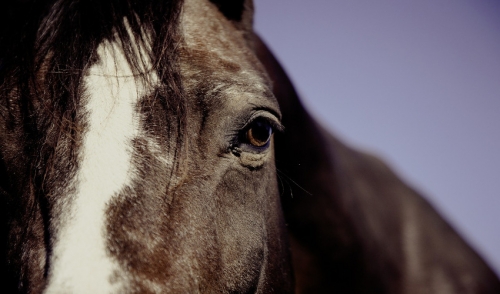{article.name}
Stay Informed
Dealing With Boredom in Horses

- Share this:
- Share on Facebook
- Pin on Pinterest
- Tweet on Twitter
Horses are intelligent, curious animals that bore easily when they must be kept in stalls or small enclosures for long periods. While occasional boredom is normal, extensive boredom can lead to health and behavioral problems, but there are many things owners can do to keep their horses entertained.
Why Horses Get Bored
Predictable routines and small stalls or enclosures that lack stimulation can easily bore horses. A lack of activity and exercise, or always performing the same tasks and exercise routines, can quickly become boring, and if horses have no way to relieve that boredom, they may suffer. An unwillingness to work or sluggish, listless behavior is the first sign of boredom, and horses that are habitually bored may repeated circle their stall, paw the ground or bang their heads on wall or beams. Temperament changes can occur when horses are frequently bored, and a bored horse may start kicking or otherwise showing aggression, or could become destructive and chew on posts, doors or beams.
Keeping Your Horse Entertained
To minimize the mental and physical stresses of boredom, keep your horse entertained by
- Increasing Space: If a horse has more room to explore, it will get bored less easily. A larger stall allows the horse to turn and move about more freely, and a larger corral offers more turf to explore and more things to see.
- Changing Location: If possible, moving a horse to a new area can alleviate boredom for awhile. Turning a horse out into a different corral gives it a new place to explore, and a new stall is equally interesting.
- Providing Toys: Horse-friendly toys can entertain a horse for hours. Toys may be different colors or shapes to intrigue the horse, and flavored toys are popular for nibbling. Horses may tug or pull toys, or carry toys around for entertainment.
- Interacting: Even in winter, a quick visit to the barn can help distract the horse and reduce its boredom. If possible, turn the horse out with other barnyard animals such as ponies, goats or other horses for companionship.
- Varying Routines: The same work tasks or exercise routines can quickly bore an intelligent horse. Alternate routines and work different tasks into the daily schedule to keep the horse involved with different activities that can keep it mentally stimulated.
- Teaching Tricks: Horses can learn tricks like any animal, including picking up particular items and recognizing patterns. Clicker or treat training techniques can be useful and will keep the horse interested throughout a training session.
If a horse continues to show signs of boredom even when adequate stimulation and variation is available, it may be necessary to consult a veterinarian. Bored or stressed behaviors can be symptoms of more serious ailments, and should be treated appropriately.
Special Offers
We are constantly adding new specials to our site. Be sure to check back often!




Comments